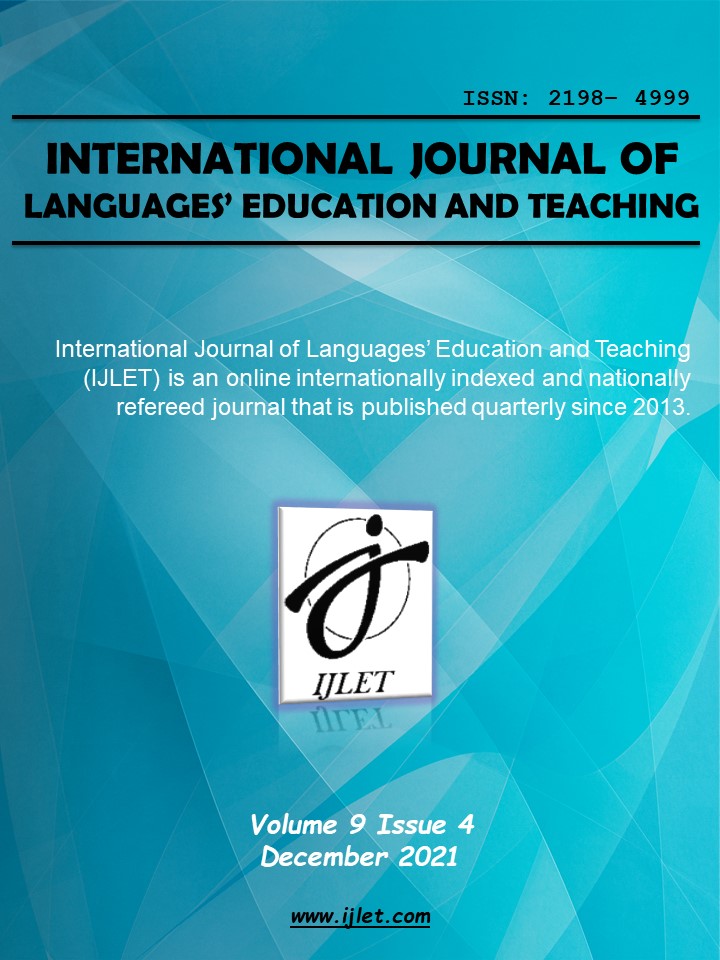Türkçenin Yabancı Dil Olarak Öğretiminde İletişimsel Yöntemin Öğrencilerin Konuşma Tutum Ve Başarılarına Etkisi (Somali Örneği)
Author :
Abstract
İletişimsel yöntemin Türkçenin yabancı dil olarak öğretiminde öğrencilerin konuşma tutum ve başarılarına ne derece tesir ettiğini belirlemek için yapılan bu çalışma ön test-son test kontrol gruplu yarı deneysel desenli nicel bir araştırmadır. Araştırmanın çalışma grubunu, 2018-2019 eğitim öğretim yılında Somali Sağlık Bilimleri Üniversitesi’nde A2 kurunda eğitimini sürdüren ve seçkisiz olarak seçilen 30 öğrenci oluşturmaktadır. Uygulama safhasında deney grubu öğrencileri iletişimsel yönteme göre, kontrol grubu öğrencileri ise geleneksel yönteme göre eğitim almışlardır. Çalışmanın uygulama süreci haftada 30 ders saati olmak suretiyle 8 hafta sürmüştür. Öğrencilerin konuşma başarılarıyla ilgili veriler bağımsız ve karşılıklı konuşma sınavı yapılarak video kayıt tekniğiyle toplanmıştır. Konuşma becerisi tutumları ile ilgili veriler ise Topçuoğlu Ünal ve Özer tarafından geliştirilen Konuşma Becerisi Tutum Ölçeği ile toplanmıştır. Verilerin normallik analizinin yapılmasında ve ulaşılan veriler üzerinde hangi istatistiksel işlemlerin yapılacağının tespit edilmesinde Shapiro-Wilks testinden yararlanılmıştır. Uygulama sonrasında elde edilen verilere bağımsız örneklem t-testi ve bağımlı örneklem t-testi uygulanmıştır.
İletişimsel yöntem ile ders işlenen deney grubu öğrencilerinin geleneksel yöntem ile ders işlenen kontrol grubu öğrencilerine kıyasla konuşma becerisi başarı boyutunda anlamlı düzeyde artış olduğu sonucuna varılmıştır. Konuşma becerisi tutum ölçeğindeki kaygı boyutunda iletişimsel yöntemle ders işlenen deney grubunda kaygı boyutu azalırken geleneksel yöntemle ders işlenen kontrol grubunda kaygı boyutu sabit kalmıştır. Sevgi boyutunda ise deney grubundaki öğrencilerin kontrol grubundaki öğrencilere kıyasla uygulama sonrası puanlarının anlamlı düzeyde artış gösterdiği sonucuna varılmıştır.
Keywords
Abstract
This study is a quantitative pre-test post-test control group with quasi-experimental design research that is done to determine how much it affects to the effects of communicational methods to students’ speaking attitude in teaching turkish as a foreign language.the study group of the reserach are constituted by 30 students that are chosen randomly and studying in A2 level at Somali health sciences university in 2018-2019 academic year. In the implementation phase the students of experimental. Group has been trained according to the communicational methods, whereas the students of the control group has been trained according to the traditional method. The implementation process of the study has been continued 8 weeks provided that each week is 30 lesson hour. The data about students’ speaking success are collected through video recording independently and by doing conversation exam. The data about the attitude of the speaking skill are collected with the scale of attitude of speaking skill developed by Topçuoğlu ünal and Özer. Shapiro-wilks test has been utilized in making the normality analysis of the data and in determining which statistical process to make. Accessed data after the implementation has been applied independent sample t test and dependent t test. It was concluded that there was a significant increase in The speaking skill of the Experimental group students that are taught communicational method in comparison control group students that are taught traditional method.
In the anxiety dimension of the speaking skills attitude scale, while the anxiety dimension decreased in the experimental group taught with the communication method, the anxiety dimension remained constant in the control group taught with the traditional method. In the love dimension, it was concluded that the scores of the control group in the experimental group increased significantly after the education application.
Keywords
- Aktaş, T. (2004). Yabancı dil öğretiminde iletişimsel yeti. Selçuk Üniversitesi Sosyal Bilimler Enstitüsü Dergisi, 12, 45-57.
- Altın, M. (2018). Kuantum öğrenme modelinin ortaokul öğrencilerinin yabancı dilde konuşma becerisi, konuşma kaygısı ve öz-yeterliği üzerindeki etkisi (Yüksek lisans tezi). Aydın Adnan Menderes Üniversitesi Sosyal Bilimler Enstitüsü, Aydın Aytaş, A. (2014). Yapılandırmacı öğrenme yaklaşımının öğrencilerin İngilizce konuşma becerisine etkisinin belirlenmesi (Yüksek lisans tezi). Ankara Üniversitesi Eğitim Bilimleri Enstitüsü, Ankara.
- Bergil, A. S. (2010). İngilizce öğretiminde konuşma becerilerini geliştirmeye yönelik alternatif bir teknik: yaratıcı drama (Yüksek lisans tezi). Gaziosmanpaşa Üniversitesi Sosyal Bilimler Enstitüsü, Tokat.
- Büyüköztürk, Ş. (2007). Sosyal bilimler için veri analizi el kitabı (8. Baskı). Ankara: Pegem Yayıncılık.
- Erten Dalak, H. D. (2017). Yabancı dil olarak Türkçe öğretiminde iletişimsel yaklaşımın deyim öğretimindeki başarıya etkisi (Yüksek lisans tezi). Hacettepe Üniversitesi Türkiyat Araştırmaları Enstitüsü, Ankara.
- Demirel, Ö. (2007). Yabancı dil öğretimi. Ankara: Pegem Yayıncılık.
- Doğan, C. (2012). Sistematik yabancı dil öğretim yaklaşımı ve yöntemleri. İstanbul: Ensar Neşriyat.
- Göçer, A., Tabak, G. ve Coşkun, A. (2012). Türkçenin yabancı dil olarak öğretimi kaynakçası. Türklük Bilimi Araştırmaları Dergisi (TÜBAR), 32, 73-126.
- Göçer, A. (2015). Türkçenin yabancı dil olarak öğretiminde konuşma becerisinin kazandırılması. Trakya Üniversitesi Sosyal Bilimler Dergisi, 17(2), 21-36.
- Gürbüz, M.(2018). Diyalogla öğretim etkinliklerinin İngilizce konuşma becerisine etkisi (Yüksek lisans tezi). Kafkas Üniversitesi Sosyal Bilimler Enstitüsü, Kars.
- Karasar, N. (2006). Bilimsel araştırma yöntemi; kavramlar, ilkeler, teknikler (16.baskı). Ankara: Nobel Yayınları.
- Keser, S. (2018). Yabancı dil olarak Türkçe öğretiminde konuşma becerisinin geliştirilmesinde karşılaşılan güçlükler (Yüksek lisans tezi). Hacettepe Üniversitesi Türkiyat Araştırmaları Enstitüsü, Ankara.
- Memiş, M. R., Erdem, M. D. (2013). Yabancı dil öğretiminde kullanılan yöntemler, kullanım özellikleri ve eleştiriler. Turkish Studies, 8/9, 297-318.
- Özcan, M. (2015). Yabancı Dil Olarak Arapça Konuşma Becerisi Öğretiminde İletişimsel Yaklaşıma Dayalı Etkinliklerin Kullanımı. 21. Yüzyılda Eğitim ve Toplum Eğitim Bilimleri ve Sosyal Araştırmalar Dergisi, 4 (10), 153-164.
- Özdemir, E. (2013). Türkçeyi yabancı dil olarak öğrenenlerin konuşma kaygılarının kaynakları (Yüksek lisans tezi). Gazi Üniversitesi Eğitim Bilimleri Enstitüsü, Ankara.
- Savignon, S. J. (2002). Interpreting communicative language teaching. London: Yale University Press.
- Şen, Ü. ve Boylu, E. (2015). Türkçeyi yabancı dil olarak öğrenen İranlı öğrencilerin konuşma kaygılarının değerlendirilmesi, Mustafa Kemal Üniversitesi Sosyal Bilimler Enstitüsü Dergisi, 30, 13-25.
- Topçuoğlu Ünal, F. ve Özer, D. (2017). Ortaokul öğrencileri için konuşma becerisi tutum ölçeği: geçerlilik ve güvenirlik çalışması. International Journal of Language Academy, 120-131.
- Ulusoy, G. (2012). Orta öğretim İngilizce derslerinde otantik video kullanımı: durum komedisinin konuşma becerisine etkisi üzerine deneysel bir çalışma (Yüksek lisans tezi). Süleyman Demirel Üniversitesi Fen Bilimleri Enstitüsü, Isparta.
- Yazıcı, M. H. (2018). Yabancı dil olarak Türkçe öğrenen öğrencilerin sözlü iletişim stratejileri: konuşma becerisi (Yüksek lisans tezi). Kırıkkale Üniversitesi Sosyal Bilimler Enstitüsü, Kırıkkale.
